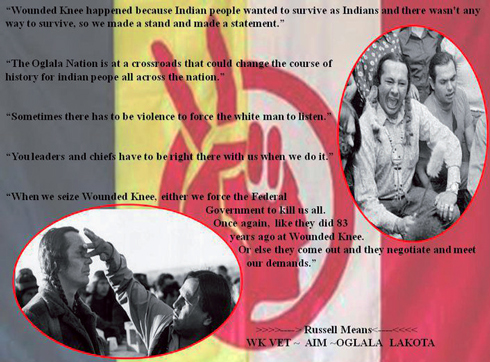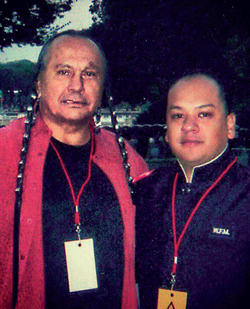Remembering Russell Means
By Askia Muhammad -Senior Correspondent- | Last updated: Nov 20, 2012 - 4:15:44 PMWhat's your opinion on this article?

Russell Means (November 10, 1939 –
October 22, 2012)
|
The Alcatraz Red Power Movement (ARPM) grew out of that takeover and spawned a new era of social protests—from the “Trail of Broken Treaties” in 1972, to the 72-day stand-off at Wounded Knee on the Pine Ridge Reservation in 1973, to the “Longest Walk” in 1978—among Indians of All Tribes (IAT) demanding that the U.S. government honor its treaty obligations by providing resources, education, housing, and healthcare, and to alleviate poverty among the tribes.
Activist and actor Russell Means, the former leader and co-founder with Dennis Banks of the American Indian Movement (AIM), who participated in that Alcatraz takeover, succumbed to throat cancer. He made his transition on Oct. 22 at his ranch on the Pine Ridge Reservation in South Dakota. He was 72.
“Our dad and husband now walks among our ancestors,” his family said in a statement. Days later, more than 1,000 people attended a 12-hour memorial service featuring a tribute in his native Lakota, delivered against the backdrop of the harsh prairie where he was born.
The funeral began with a procession led by 21 horses—one without a rider, said to be carrying his spirit. His ashes were later scattered in the Black Hills of western South Dakota, according to published reports.

|
Mr. Means was a prominent leader. He was one of the participants in that struggle at Alcatraz which continued for 19 months until June 1971. His roles as a featured actor in more than 30 films including: “Last of the Mohicans,” and “Natural Born Killers,” as the voice of Chief Powhatan in the Disney animated feature “Pocahontas,” Disney’s third most popular animated video; and his campaign for the 1988 Libertarian Party presidential nomination made him possibly the nation’s best-known Indian since Sitting Bull and Crazy Horse.
“He will be replaced by thousands,” Bill Means, Russell Means’s only surviving brother told a reporter. “One person is not going to replace him, but through his work, through his family, he will be replaced 1,000 times over.”
“He never backed down from addressing the issues of treaty rights that were not lived up to, how Indian people have been treated since the Europeans invaded the Americas. He never wavered or quivered when it came to defending AIM—the American Indian Movement,” Jay Winter Nightwolf, host of “The Nightwolf Show: American Indian Truths” on Pacifica Radio station WPFW-FM in Washington, told The Final Call.

Student Minister Abel Muhammad with Russell Means.
|
“From there they came to Washington, D.C., they brought thousands of Native people here in the ‘70s where they took control of the Bureau of Indian Affairs (BIA) Department of Interior. That was a seven day standoff. It got to the point that the White House, (President) Nixon had to deal with the ‘Indian problem.’
“He made a statement, in his words he said, ‘It’s just unconscionable that America has become so stupid.’ Well, that was Russell Means. He wrote a book, ‘Where White Men Fear to Tread.’ It was his autobiography.
“He did a lot of good. He did a lot of good for Indian people all over the Americas. If I had to place Russell Means in history somewhere, I would place him right beside Chief Sitting Bull, Chief Fools Crow, and Chief Crazy Horse, because he never gave up on his people and he never, ever gave up on an opportunity to speak for his people,” Mr. Nightwolf concluded.
Now, every November since 1975, Indian people have gathered on Alcatraz Island on what is called “Un-Thanksgiving Day” to honor the occupation and those who continue to fight for Native American rights today.
INSIDE STORIES AND REVIEWS
-
-
About Harriett ... and the Negro Hollywood Road Show
By Rabiah Muhammad, Guest Columnist » Full Story -
Skepticism greets Jay-Z, NFL talk of inspiring change
By Bryan 18X Crawford and Richard B. Muhammad The Final Call Newspaper @TheFinalCall » Full Story -
The painful problem of Black girls and suicide
By Charlene Muhammad -National Correspondent- » Full Story -
Exploitation of Innocence - Report: Perceptions, policies hurting Black girls
By Charlene Muhammad -National Correspondent- » Full Story -
Big Ballin: Big ideas fuel a father’s Big Baller Brand and brash business sense
By Bryan Crawford -Contributing Writer- » Full Story






 Click Here Stay Connected!
Click Here Stay Connected!








